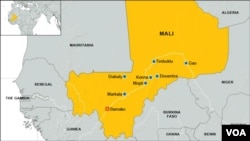As the conflict continues in northern Mali, medical aid teams are helping civilians who’ve been displaced. Doctors Without Borders says it’s providing primary health care in some regions, while dispatching mobile medical units to others.
Doctors Without Borders – also known by the French acronym MSF – says it’s providing care and treatment in Mopti, Gao, Douentza and Timbuktu. It’s also managed to get a team to Konna this week. The town’s about 70 miles north of Mopti and the scene of recent heavy fighting.
“All the teams are running hospitals and supporting activity for the civilians. It’s quite difficult to know where we are going in this moment. We are keeping our teams in all those locations for the moment and still trying to run the hospitals and the clinics,” said Rosa Crestani, the group’s emergency coordinator for intervention in Mali.
She said, so far, medical teams have only seen a few civilians actually wounded in the fighting between the French-led intervention force and the militias.
“But we are really concerned about their situation because the movement – not only for our teams, but for the civilians in this area – is still very dangerous. Since last Sunday, we are receiving in Fassala, the entry point in Mauritania, several hundred new refugees from Mali. We are running a camp in M’bera. That is the camp in Mauritania. There were already 55,000, more or less, refugees since last year. And now, for example, in the last three days there are around 1,000 new arrivals a day,” she said.
Crestani said that the civilians not only fear fighting on the ground, but bombing from the air.
“Women and children are mainly trying to escape or to hide themselves. This is the situation we are seeing in the villages and the towns where we are working. They are trying to keep themselves in the houses – not moving around a lot,” she said.
However, she said once word gets out that medical teams have arrived, civilians show up in large numbers. Many need treatment for malaria. Crestani says gaining greater access to regions in northern Mali is the goal of all humanitarian groups there.
Doctors Without Borders – also known by the French acronym MSF – says it’s providing care and treatment in Mopti, Gao, Douentza and Timbuktu. It’s also managed to get a team to Konna this week. The town’s about 70 miles north of Mopti and the scene of recent heavy fighting.
“All the teams are running hospitals and supporting activity for the civilians. It’s quite difficult to know where we are going in this moment. We are keeping our teams in all those locations for the moment and still trying to run the hospitals and the clinics,” said Rosa Crestani, the group’s emergency coordinator for intervention in Mali.
She said, so far, medical teams have only seen a few civilians actually wounded in the fighting between the French-led intervention force and the militias.
“But we are really concerned about their situation because the movement – not only for our teams, but for the civilians in this area – is still very dangerous. Since last Sunday, we are receiving in Fassala, the entry point in Mauritania, several hundred new refugees from Mali. We are running a camp in M’bera. That is the camp in Mauritania. There were already 55,000, more or less, refugees since last year. And now, for example, in the last three days there are around 1,000 new arrivals a day,” she said.
Crestani said that the civilians not only fear fighting on the ground, but bombing from the air.
“Women and children are mainly trying to escape or to hide themselves. This is the situation we are seeing in the villages and the towns where we are working. They are trying to keep themselves in the houses – not moving around a lot,” she said.
However, she said once word gets out that medical teams have arrived, civilians show up in large numbers. Many need treatment for malaria. Crestani says gaining greater access to regions in northern Mali is the goal of all humanitarian groups there.





